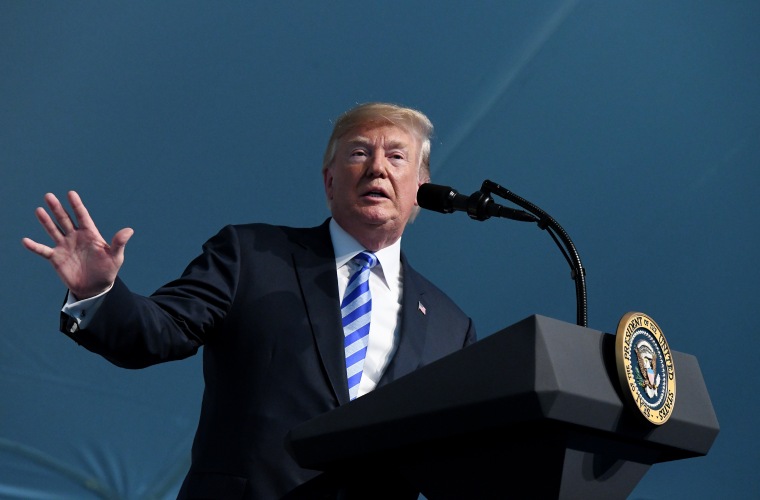The first sign of trouble came in December. As the investigation into the Russia scandal intensified, and credible allegations that Donald Trump obstructed justice came into focus, one of the president's attorneys argued on the record that Trump "cannot obstruct justice."
A day later, the same lawyer, John Dowd, added that because the president is the nation's "chief law enforcement officer," it's simply not possible for him to "obstruct himself."
What we didn't know until 48 hours ago was that this argument wasn't simply floated via the media as part of some kind of public-relations campaign. The New York Times reported on a 20-page memo Trump's lawyers sent in January to Special Counsel Robert Mueller, in which the president's defense team adopted a stunning legal posture:
President Trump's lawyers have for months quietly waged a campaign to keep the special counsel from trying to force him to answer questions in the investigation into whether he obstructed justice, asserting that he cannot be compelled to testify and arguing in a confidential letter that he could not possibly have committed obstruction because he has unfettered authority over all federal investigations.In a brash assertion of presidential power, the 20-page letter -- sent to the special counsel, Robert S. Mueller III, and obtained by The New York Times -- contends that the president cannot illegally obstruct any aspect of the investigation into Russia's election meddling because the Constitution empowers him to, "if he wished, terminate the inquiry, or even exercise his power to pardon."
The Times published the full document online here. It argues, among other things, "[T]he President not only has unfettered statutory and Constitutional authority to terminate the FBI Director, he also has Constitutional authority to direct the Justice Department to open or close an investigation, and, of course, the power to pardon any person before, during, or after an investigation and/or conviction. Put simply, the Constitution leaves no question that the President has exclusive authority over the ultimate conduct and disposition of all criminal investigations and over those executive branch officials responsible for conducting those investigations."
Americans have probably never seen a memo quite like this one. In it, Trump's lawyers make the case that he not only can't obstruct justice, but also that he can't be subpoenaed. In their vision, the president is effectively above the law, capable of dictating the terms, scope, and duration of any federal investigation, for any reason and at any time.
In Trump World's vision, the legal system is the president's system. Mueller may be leading an investigation, but it's actually Trump's investigation.
More than two centuries after Louis XIV is rumored to have said, "L'Etat, c'est moi" ("I am the state"), an American president's lawyers articulated a similar principle, in writing, for a special counsel who considers that president to be a subject of an ongoing criminal investigation.
I've seen some suggestions that this constitutes a constitutional crisis of sorts, since the idea that our laws are somehow subservient to Trump's power and wishes is fundamentally at odds with the American system of government.
But in practical terms, it's only a crisis if the argument works. Presidents and their lawyers can make all kinds of audacious claims; what matters is what they manage to get away with.
And in this case, Trump and his team expect to get away with the idea that a sitting president cannot commit a crime -- Rudy Giuliani said yesterday Trump could've literally shot James Comey and he still couldn't face prosecution while in office -- because our chief executive is immune from punishment under the system he leads.
To prevent a crisis, such an argument must be forcefully rejected.
As the fallout of Saturday's report continues, consider a few additional angles:
* The idea that it's an institutional impossibility for a president to obstruct justice is belied by the fact that Nixon and Clinton both faced articles of impeachment on this exact point.
* Giuliani argued yesterday that Trump could "probably" pardon himself, though he doesn't expect that to happen. [Update: Trump tweeted this morning that he has an "absolute right" to pardon himself, though he added, "But why would I do that when I have done nothing wrong?"]
* The argument in the newly released memo helps shed light on a variety of other Trump controversies. If a president's Article II powers are so expansive that he or she can dictate the terms of federal law enforcement, he or she can also dictate how every other part of the government operates. Pressuring the Postmaster General, for example, to punish a perceived White House enemy, is perfectly permissible under this model.
* There are suddenly new reasons to be concerned about the competency of the president's legal team: the memo's footnotes were a mess, and at one point, Trump's lawyers pointed to the wrong obstruction-of-justice statute.
* The memo suggests a Trump-Mueller interview is unlikely. "The president's prime function as the chief executive ought not be hampered by requests for interview," it states. "Having him testify demeans the office of the president before the world."
Putting aside the irony of Trump's lawyers expressing concern about demeaning the office of the presidency, it's likely that Mueller would find this posture unsatisfactory. If so, the special counsel could subpoena the president, but again, the memo also suggests that as far as Trump's defense team is concerned, it's within his authority to simply ignore the subpoena.
